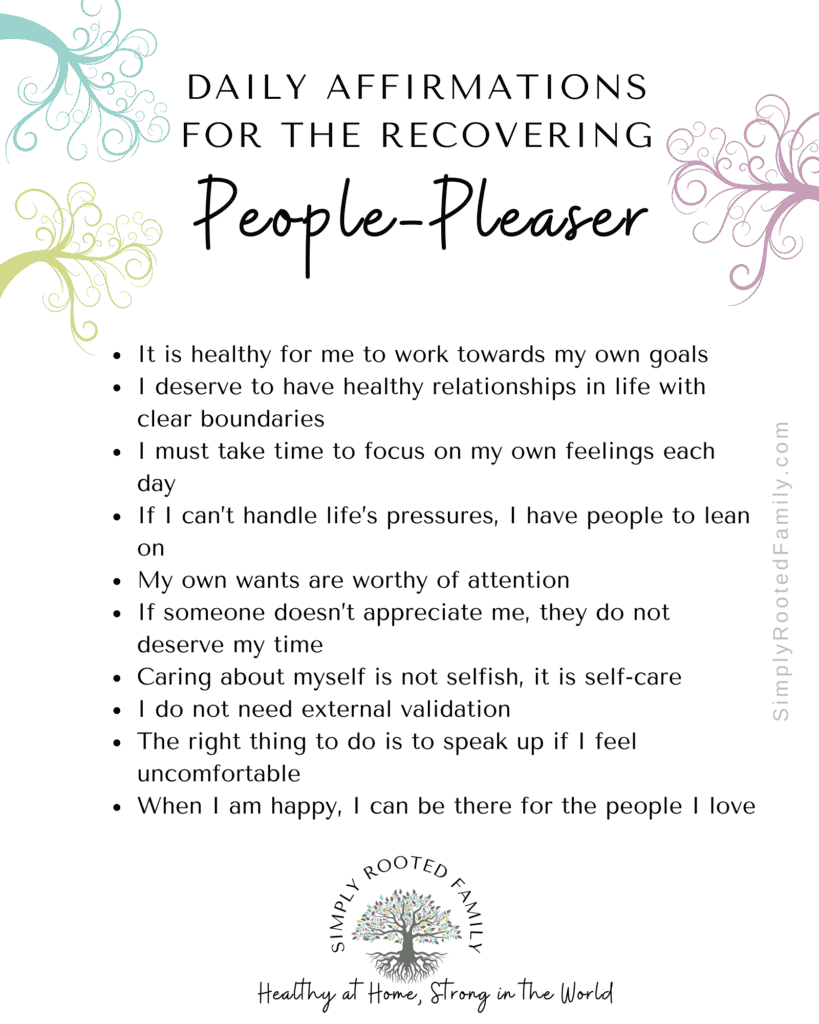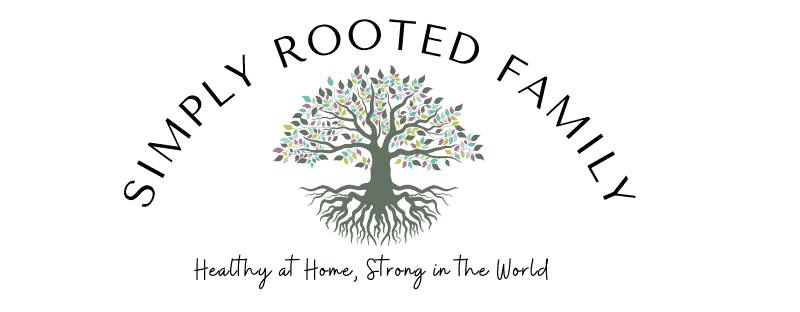Learn the red flag signs that you may be a people-pleaser and a simple 5 step recovery plan to help you develop healthy boundaries and positive relationships.
My name is Renee, and I have an unhealthy addiction to pleasing people at all costs.
Phew, it felt good to get that out in the open.
I come from a long line of people-pleasers. To this day, my mother would walk barefoot across hot coals if I simply mentioned it might make me happy.
I am the textbook definition of a people-pleaser:
- Deep urge to put the needs of others before my own, even if it is impacting my physical health or mental sanity. CHECK.
- The fear of rejection or disappointing others encompasses every action. CHECK.
- Spending time on myself made me feel guilty. CHECK.
- Has a hard time saying that two letter word (No). CHECK.

Learn other Achievable Goals that all Moms Should Strive for.
The unique thing about being part of the human species, is that we have the brain power to change things about ourselves that we want to change.
And I got to the point where things had to change.
They had to change really fast, or I would be strapped to a fast moving train on the path to mental health issues and crippling exhaustion.
Also learn WHY you are a people pleaser here!
5 Signs you are a People-Pleaser
Before you start your recovery plan, it is important to identify the common signs and red flags of chronic people-pleasing.
These include:
- Struggles with low self-esteem
- Feeling that spending time taking care of your own needs is “selfish”
- Hiding your true feelings if you think they will make others feel uncomfortable
- Your sense of self worth relies on the approval of others
- Constantly apologizing for things that aren’t your fault
A people-pleaser is often seen as a nice person or a good friend with good intentions, but the more he or she hides negative feelings, the clear lines of communication slowly fade away.
We all know of someone who puts the care of others before their own, then one day shatters like glass. They usually dissolve long-standing friendships with one unexpected outburst, similar to the straw that broke the camel’s back. Or they eventually turn to a therapist or vice for comfort.
Overtime, the act of chronically pleasing others can fester feelings of anger and frustration and result in passive-aggressive behavior.
Related: How to Teach Kids to be Assertive
The good thing, is that you can change. This recovery plan will help you stop people-pleasing and build a healthy relationship with yourself.

You may also like: 3 Ways to Find Yourself When Raising Big Kids
People-Pleaser Anonymous Recovery Plan
You identified yourself as a people-pleaser.
Congratulations! Many people don’t realize that the cause of their current (or future) anxiety or stress can be related to the act of putting others before themselves.
Related: 5 Proven Ways to Battle Mom Burnout
Now it is time to learn how to change your course in a positive way.
Many people develop their own coping mechanisms, which are often ineffective and self-damaging.
In fact, a recent poll of 100 self-identified people pleasers show that they often develop their own coping mechanism to deal with social situations:
- Pretending to agree or feel “fine”, when actually upset – 67%
- Procrastinating on a necessary but uncomfortable social situation – 61%
- Being friendly and nice instead of directly expressing feelings – 45%
Instead, a healthy way to be true to yourself starts with this 5 step plan:
1) Drop Toxic Relationships, Like, Yesterday
Unhealthy relationships are notably the most dangerous thing for a people-pleaser who is committed to change.
When a person discovers your tendency to constantly, please, they may take advantage of your good intentions. There are telltale signs that can help you identify a toxic relationship. These may include:
- Every conversation is about them
- They don’t celebrate your successes
- They don’t support you through your struggles
- You can’t be yourself around them
- They drain you with favors
- They are jealous when you have other friends
An important step is to fix the primary relationships in your life.
You can try to talk to your friend or family member (explain how you feel), but chances are you will eventually just have to back away from them.
Start by reducing how much time you spend with them.
You will feel instant relief if it was truly an unhealthy relationship.
You may also like: Mindfulness Activities for Moms Who Need a Reminder to Live in the Moment
2) Don’t “agree” when you actually disagree
People pleasers are often afraid that disagreeing is a bad thing and is saturated with negative emotions. In reality, people should feel comfortable politely disagreeing with others.
When it comes to speaking up, start with something simple.
Your friend would like to go get sushi, but you don’t like sushi. Resist the urge to say “Sure, sushi sounds great.”
Instead, speak up and tell your friend that you’d like to eat somewhere else.
These simple situations can help you gain the confidence to voice your opinions more often.
Is your kid a people pleaser? Try these tips to raise self-assured kids.
3) Schedule time for YOU
Literally schedule some free time for yourself.
My husband and I started to schedule a yearly kid-free weekend trip. We spend the entire year focused on our three kids, and we feel that a weekend getaway helps us recharge.
Take time during your busy day or week to explore a new hobby, meditate, exercise, read — or do anything that makes you happy.
Make sure you pick a specific time, place, and activity for your relaxation time.
Often, we say we will make an effort to take some “me time”, but without a plan it usually gets bumped off our to-do list.
Try writing in a Journal with these easy prompts.

4) Say These People Pleaser Syndrome Affirmations Daily
While kindness, empathy, and respect are an important part of life, we need to prioritize self-care.
Spend less time trying to be the nice guy or proper lady. Focus on what is right, being your true self, and the best way to support the ones you love.
Repeat these daily affirmations:
- It is healthy for me to work towards my own goals
- I deserve to have healthy relationships in life with clear boundaries
- I must take time to focus on my own feelings each day
- If I can’t handle life’s pressures, I have people to lean on
- My own wants are worthy of attention
- If someone doesn’t appreciate me, they do not deserve my time
- Caring about myself is not selfish, it is self-care
- I do not need external validation
- The right thing to do is to speak up if I feel uncomfortable
- When I am happy, I can be there for the people I love
Print them here:

For affirmations for kids, click here.
5) Rely on the word NO to develop healthy boundaries
The last thing (and most important step) is to learn to say that little two letter word: No.
Personally, this has always been the most difficult. I have a strong need for people to see me as a good person. Also, I feel that I am letting everyone down if I don’t fix their needs.
Recently, I got stuck in the cycle of doing so many free favors for people that I was missing out on important family time.
Learning to simply say NO, changed my life. My only wish is that I learned how to say it sooner.
If saying “no” feels odd to you try phrasing it like:
- I would really love to help you if I had the time
- Unfortunately, have too much going on right now, but I will reach out if anything changes
- I wish I could help, but my family needs me
- No, I can’t at this time, but let’s touch base in the future if you are still free
- I’m sorry I can’t – maybe reach out to ____
You will be surprised how much people will understand and appreciate your honesty.
Related: How to Wire the Brain for Happiness
Final Thoughts for the Recovering People-Pleaser
When you stop being a people-pleaser, you start to develop a healthy relationship with yourself.
And, when you are happy and rested, you will be able to support the ones you love.
These steps will help you still be able to “please” the people around you without having to suffer for it.
If you found this helpful, follow us on Facebook for more up to date discussions.


5 Things I Cared About in my 20s vs 30s - Simply Rooted Family
Sunday 19th of June 2022
[…] a serious case of People-people […]
Parents of Mentally Indestructible Kids Refuse to do These 5 Things - Simply Rooted Family
Wednesday 6th of April 2022
[…] Related: How to Tell if Your Kid is a People-Pleaser […]
You are Not an Angry Mom. You Just Need One of These 6 Things - Simply Rooted Family
Wednesday 6th of April 2022
[…] Related: 5 Steps to STOP being a People-Pleaser […]
How to be a Super Mom When you are a Super Tired Mom - Simply Rooted Family
Monday 28th of March 2022
[…] Related: Important Things People-Pleasers Need to Do to Improve Their Mental Health […]
Dear Child, Not Everyone is Going to Like You - And That's Okay - Simply Rooted Family
Tuesday 22nd of February 2022
[…] Also check out: How to Stop Being a People-Pleaser […]